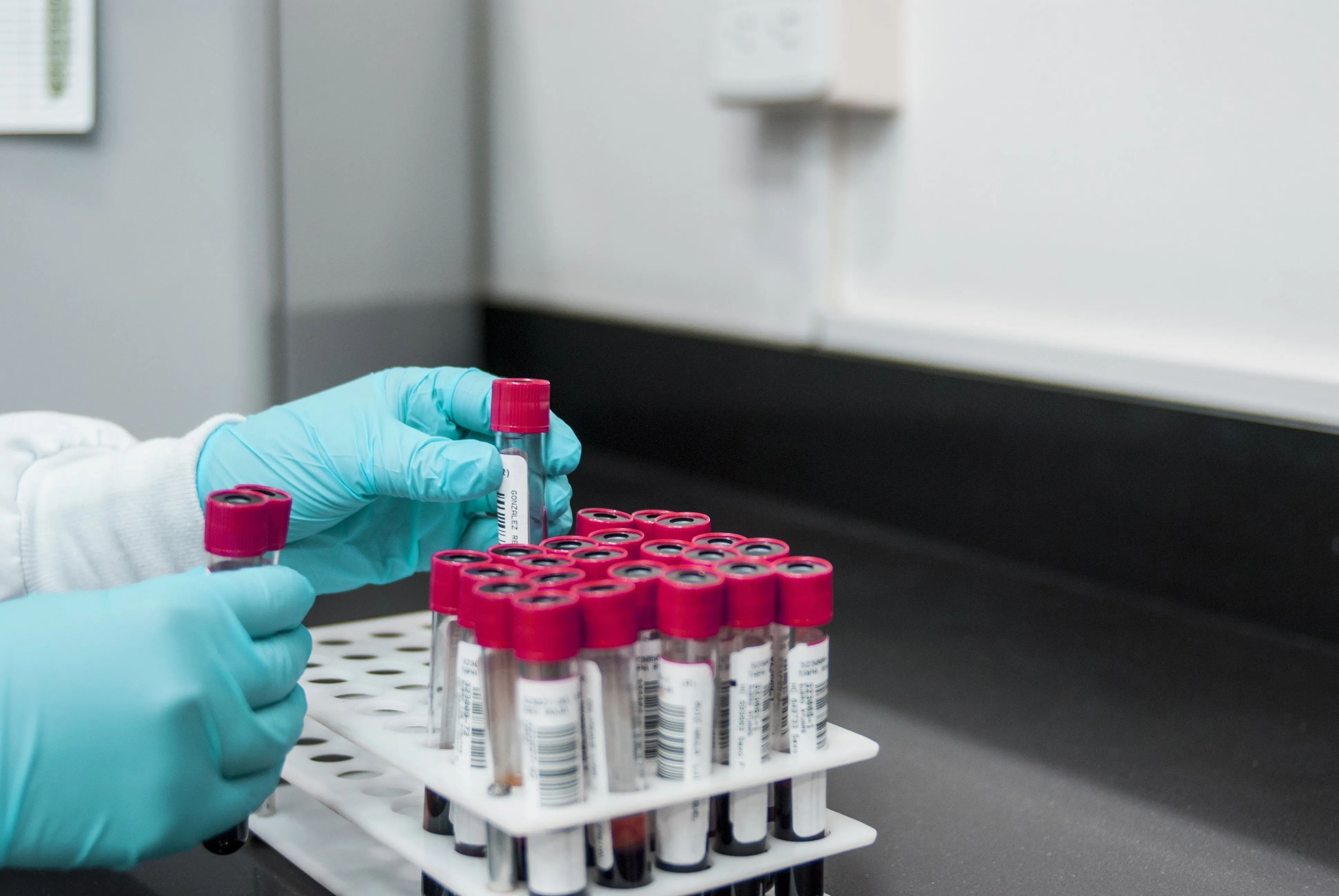Why Hashimoto’s Makes Losing Weight So Difficult
Get Personalized Insights

Why Hashimoto’s Makes Losing Weight So Difficult
People who have managed their hypothyroidism with medication often find that, despite their sincere efforts, they are unable to restore their normal body weight.
The main challenge for patients with Hashimoto's disease is difficulty regulating body weight to normal levels, even when following appropriate lifestyle measures and medical guidance.
Specialised tests can identify the deficiencies and metabolic disorders associated with the difficulty patients with Hashimoto’s have in reducing their weight.
Hashimoto’s disease is a disease with a significant metabolic background. Insulin resistance is one of the key metabolic disorders that contribute to weight gain in this group of patients [1–3].
It is an autoimmune condition that develops from the combined effect of multiple disorders, many of which also contribute to difficulty managing body weight [4–8]:
- Insulin resistance
- Immune system dysfunction (autoimmunity, susceptibility to infections)
- Vitamin D deficiency
- Chronic inflammation
- Lack of micronutrients (minerals, vitamins, fatty acids, antioxidants)
- Hormonal deregulation
- Microbiome disruption
- Impaired metabolism (energy production)
- Impaired lipid metabolism
These factors harm both thyroid function and overall metabolism. Over time, they change the composition and structure of thyroid cells and lead to gradual weight gain.
Insulin Resistance and Weight Control Challenges
Long before hypothyroidism develops, insulin resistance disrupts metabolism and promotes the accumulation of visceral fat in the abdomen.
Insulin is one of the body’s most important hormones. It lowers blood glucose levels and regulates how the body uses and stores energy. It also influences appetite by controlling hunger and satiety.
By regulating energy combustion and storage, insulin affects nearly the entire endocrine system. When its function is impaired, it destabilises hormonal balance and negatively affects the thyroid and other organs.
Elevated insulin levels “lock” fat stores, preventing fat burning and increasing hunger. People with insulin resistance and Hashimoto’s disease often feel they can’t get full after their meals and are constantly hungry.
At the same time, the body’s inability to metabolise fat leads to low energy levels, causing individuals to eat more in an effort to gain energy—further worsening metabolic and hormonal imbalances. The body continues to store fat but cannot burn it efficiently.
Additional disorders and deficiencies—including vitamin D deficiency, gut microbiome imbalance, and insufficient levels of zinc, magnesium, chromium, and selenium—combined with chronic inflammation, further worsen metabolism and make weight control even more difficult.
Thus, many people who have managed their hypothyroidism with medication still struggle, despite sincere efforts, to restore their normal body weight.

Thyroid Medication and Persistent Symptoms
Taking medication to improve thyroid hormone levels is an essential part of treatment, but on its own, it is not enough to achieve full control of the condition.
It is very common for patients with Hashimoto’s to have thyroid function test results within the normal range, yet still not feel well. They struggle to maintain a healthy body weight despite sincere dietary efforts and often experience mood swings, digestive disturbances, increased susceptibility to infections, and low energy levels.
A person may have normal levels of thyroid hormones and TSH, yet still experience most of the above symptoms.
The external administration of hormones is a vital tool that can improve a patient’s clinical condition and quality of life. However, medication adjustments made two or three times a year cannot replicate the body’s continuous and precise regulation, which occurs with responses within seconds
Even when the thyroid gland is functioning at only 20% of its normal capacity, hormone replacement can compensate for the remaining 80% without negatively affecting the patient’s quality of life.
The residual 20% of gland function can still support many of the body’s normal metabolic adjustments to daily demands, allowing for a very good quality of life.
For this reason, it is crucial to preserve any remaining thyroid function that enables the body to adapt metabolically to these changes.
A Comprehensive Root-Cause Approach
Modern care for patients with Hashimoto's thyroiditis should combine hormone regulation through medication with the identification and correction of deficiencies and metabolic disorders that that led to the onset of the disease and worsen its progression if left unaddressed.
This principle applies to all autoimmune diseases, but it is particularly important in Hashimoto’s. Correcting the underlying deficiencies and metabolic disorders that affect weight, mood, energy levels, and gastrointestinal and immune system function is essential for effective and lasting improvement.
Advanced Lab Tests That Redefine Care for Hashimoto’s
Identifying and correcting metabolic dysfunction requires comprehensive lab testing that profiles metabolic status, inflammation, and micronutrient levels.
These tests reveal the factors driving the development and expression of Hashimoto’s thyroiditis.
An individual’s metabolic state is the leading risk factor for disease onset [13–15].
Many of these tests are uncommon in standard healthcare. Advanced lab tests are needed to accurately detect deficiencies and metabolic disorders in people with autoimmune conditions like Hashimoto’s thyroiditis.
Kyma’s comprehensive lab panel detects metabolic disorders that promote the development of Hashimoto's disease, including [16-21]:
- Micronutrient Deficiencies: Lack of vitamin D, vitamin C, selenium, zinc, antioxidants, and omega-3s are linked to impaired immune system function, inflammation, and the health status of patients with Hashimoto's.
- Difficulty in Metabolising Simple Sugars: Excessive consumption of simple sugars beyond what the body can metabolise triggers inflammation and is a significant indicator of the disease's progression.
- Insulin Resistance: Elevated insulin levels disrupt immune system function, worsen autoimmunity, and accelerate gland destruction.
- Fatty Acid Metabolism: The ratio between omega-3 and omega-6 fatty acids is a crucial indicator of the body's ability to manage inflammation and regulate the immune system's normal response.
- State of the Microbiome: Alteration of the microbiome is linked to impaired immune system function and the ability to distinguish between its own tissues and external elements, such as pathogens and viruses.
- Thyroid Antibodies: Elevated anti-thyroid peroxidase (anti-TPO) and anti-thyroglobulin (anti-TG) antibodies reflect autoimmune activity and correlate with disease severity and progression risk.
Modern care of Hashimoto’s disease focuses on the restoration of the above factors, using medical interventions in lifestyle and nutrition with the aim of correcting deficiencies, in order to maintain the optimal metabolic state of the body.
In our clinical experience, this root-cause approach can lead to several benefits:
- Improved management of the disease, protecting the thyroid gland from further damage.
- Better functioning of the remaining thyroid gland, helping the body adjust its metabolism to daily needs and enhancing life quality.
- A gradual decrease in autoantibody levels.
- Reduction in fatigue and a boost in energy levels.
- Enhanced mood and fewer severe emotional fluctuations due to improved gland function.
- Lowered risk of harm to other organs and less chance of developing additional autoimmune diseases.
- Increase in metabolic rate and maintenance of a healthy body weight.
- Better response to medications.
It usually takes 6–8 months to achieve significant change, one year to stabilise the body at a better functional level, and about two years for optimal results.
As dysfunctions and deficiencies are corrected, the body reactivates regular metabolic processes and develops different needs.
As individuals start with their personalised health plan, changes occur in multiple metabolic pathways simultaneously. These changes must be identified and appropriately managed to continue the restoration process. Otherwise, the body’s restoration processes do not progress, significantly delaying health improvement.
Through our clinical experience, we have found that correcting the body’s deficiencies in vitamins and other elements, restoring metabolism, and regulating weight to normal levels can radically change the course of Hashimoto’s disease for the better and improve patients’ quality of life, shifting from steady worsening to steady improvement.
Promptly addressing the above issues is critical to halting the progression of the disease.
Bibliographic References
- Metabolic syndrome is associated with an increased incidence of subclinical hypothyroidism – A Cohort Study. Chia-Hsuin Chang et al. Nature > Scientific Reports. July 2017
- Thyroid disease and the metabolic syndrome Mehran et al. Current Opinion in Endocrinology & Diabetes and Obesity: October 2019
- Introducing the thyroid gland as another victim of the insulin resistance syndrome. Jorge Rezzonico et al. Thyroid 2008.
- Gut microbiome and its role in obesity and insulin resistance. Clare J Lee et al. Ann N Y Acad Sci . 2020 Feb. https://pubmed.ncbi.nlm.nih.gov/31087391/
- Metabolic pressure and the breach of immunological self-tolerance Veronica De Rosa, Antonio La Cava & Giuseppe Matarese.18 October 2017. Nature Immunology.
- Non-communicable Diseases in the Era of Precision Medicine: An Overview of the Causing Factors and Prospects. Dimitris Tsoukalas et al. Bio#Futures. Springer, Cham. May 2021.
- Immunomodulatory Function of Vitamin D and Its Role in Autoimmune Thyroid Disease. Rui Zhao et al. Front. Immunol., 19 February 2021.
- Chronic Inflammation in the Context of Everyday Life: Dietary Changes as Mitigating Factors. Margină, D.; Ungurianu, A.; Purdel, C.; Tsoukalas, D. et al Int. J. Environ. Res. Public Health, MDPI (2020). Int. J. Environ. Res. Public Health 2020, 17, 4135.
- Correlation Between Hashimoto's Thyroiditis-Related Thyroid Hormone Levels and 25-Hydroxyvitamin D Guanqun Chao, Yue Zhu, Lizheng Fang. Front Endocrinol (Lausanne). 2020 Feb. https://pubmed.ncbi.nlm.nih.gov/32117049/
- Multiple Nutritional Factors and the Risk of Hashimoto's Thyroiditis Shiqian Hu, Margaret P Rayman. Thyroid . 2017 May. https://pubmed.ncbi.nlm.nih.gov/28290237/
- Improving the Vitamin D Status of Vitamin D Deficient Adults Is Associated With Improved Mitochondrial Oxidative Function in Skeletal Muscle Akash Sinha et. al. J Clin Endocrinol Metab . 2013. https://pubmed.ncbi.nlm.nih.gov/23393184/
- Enhanced oxidative stress in Hashimoto's thyroiditis: inter-relationships to biomarkers of thyroid function.Rostami R1, Aghasi MR, Mohammadi A, Nourooz-Zadeh J. Clin Biochem. 2013 Mar
- Thyroid Hormone Effects on Mitochondrial Energetics Mary-Ellen Harper 1, Erin L Seifert. https://pubmed.ncbi.nlm.nih.gov/18279015/
- Changes in Glucose-Lipid Metabolism, Insulin Resistance, and Inflammatory Factors in Patients With Autoimmune Thyroid Disease Yi Lei et. al. J Clin Lab Anal . 2019https://pubmed.ncbi.nlm.nih.gov/31350776/
- Introducing the thyroid gland as another victim of the insulin resistance syndrome. Jorge Rezzonico et al. Thyroid 2008. https://pubmed.ncbi.nlm.nih.gov/18346005/
- Metabolic profiling of organic and fatty acids in chronic and autoimmune diseases. Evangelia Sarandi, Dimitris Tsoukalas et al. Advances in Clinical Chemistry. July 15, 2020. Elsevier Inc.
- Targeted Metabolomic Analysis of Serum Fatty Acids for the Prediction of Autoimmune Diseases. Dimitris Tsoukalas, Vassileios Fragoulakis, Evangelia Sarandi et. al. Frontiers in Molecular Biosciences, Metabolomics (6), 2019, Published 1 November 2019. https://www.frontiersin.org/articles/10.3389/fmolb.2019.00120/full
- Prediction of Autoimmune Diseases by Targeted Metabolomic Assay of Urinary Organic Acids. Dimitris Tsoukalas et. al. Metabolites. 2020 Dec 8.
- Environmental Exposures and Autoimmune Diseases: Contribution of Gut Microbiome M. Firoze Khan and Hui Wang. Front. Immunol., 10 January 2020
- Non-communicable Diseases in the Era of Precision Medicine: An Overview of the Causing Factors and Prospects. Dimitris Tsoukalas et al. Bio#Futures. Springer, Cham. May 2021.
- Metabolic pressure and the breach of immunological self-tolerance Veronica De Rosa, Antonio La Cava & Giuseppe Matarese.18 October 2017.
- Nature Immunology.Circulating metabolites in progression to islet autoimmunity and type 1 diabetes. Springer Link. Diabetologia, 2019 Dec.





